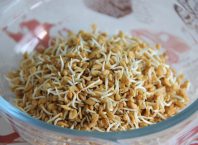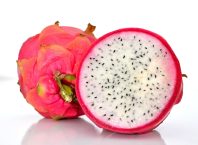Table of Contents
Despite its high saturated fat content, coconut oil has a host of health benefits. Some claim it promotes digestion, helps regulate weight gain and improves brain function. Other claims say it helps fight infections, soothes indigestion and helps the body retain moisture.
One of the biggest advantages of coconut oil is its ability to provide a long-lasting energy boost. It’s a quick source of energy because it’s made up of medium-chain triglycerides. These triglycerides are digested quickly and assimilated easily by the body.
Studies have shown that women who follow a calorie-restricted diet and add coconut oil to their diet saw a reduction in their waist size. Other studies have shown that consuming coconut oil raises good cholesterol levels, which can decrease the risk of heart disease. However, more research is needed to prove the beneficial effects of coconut oil.
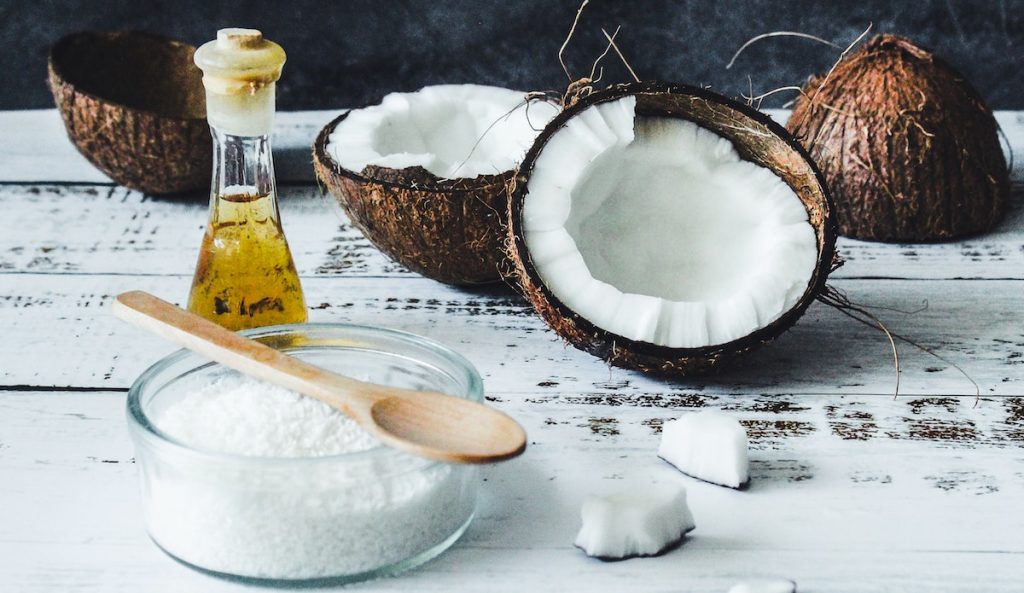
Coconut Oil Nutrition Facts
| Nutrient | Value |
| Water [g] | 0.03 |
| Energy | 892 |
| Energy [kJ] | 3730 |
| Total lipid (fat) [g] | 99.06 |
| Ash [g] | 0.03 |
| Calcium, Ca [mg] | 1 |
| Iron, Fe [mg] | 0.05 |
| Zinc, Zn [mg] | 0.02 |
| Choline, total [mg] | 0.3 |
| Vitamin E (alpha-tocopherol) [mg] | 0.11 |
| Tocopherol, beta [mg] | 0.6 |
| Tocopherol, delta [mg] | 0.18 |
| Tocotrienol, alpha [mg] | 2.17 |
| Tocotrienol, beta [mg] | 0.13 |
| Tocotrienol, gamma [mg] | 0.36 |
| Tocotrienol, delta [mg] | 0.25 |
| Vitamin K (phylloquinone) [µg] | 0.6 |
| Fatty acids, total saturated [g] | 82.48 |
| 4:0 [g] | 0.01 |
| 6:0 [g] | 0.48 |
| 8:0 [g] | 6.8 |
| 10:0 [g] | 5.39 |
| 12:0 [g] | 41.84 |
| 14:0 [g] | 16.65 |
| 15:0 [g] | 0.02 |
| 16:0 [g] | 8.64 |
| 17:0 [g] | 0.01 |
| 18:0 [g] | 2.52 |
| 20:0 [g] | 0.08 |
| 22:0 [g] | 0.02 |
| 24:0 [g] | 0.03 |
| Fatty acids, total monounsaturated [g] | 6.33 |
| 16:1 [g] | 0.02 |
| 16:1 c [g] | 0.02 |
| 18:1 [g] | 6.27 |
| 18:1 c [g] | 6.25 |
| 20:1 [g] | 0.04 |
| Fatty acids, total polyunsaturated [g] | 1.7 |
| 18:2 [g] | 1.68 |
| 18:2 n-6 c,c [g] | 1.68 |
| 18:3 [g] | 0.02 |
| 18:3 n-3 c,c,c (ALA) [g] | 0.02 |
| Fatty acids, total trans [g] | 0.03 |
| Fatty acids, total trans-monoenoic [g] | 0.02 |
| 18:1 t [g] | 0.02 |
| 18:2 t not further defined [g] | 0.01 |
| Fatty acids, total trans-polyenoic [g] | 0.01 |
| Phytosterols [mg] | 86 |
| Sources include: USDA |
Uses of Coconut Oil
Below are the top uses of coconut oil:
- Skin moisturizer
- Nourish scalp and increase hair growth
- Culinary applications
- Carrier oil
Coconut Oil Health Benefits
1. Coconut Oil Improves Heart Health
Adding Coconut Oil to your diet may help your heart health. However, it’s important to keep in mind that coconut oil is rich in saturated fats. Saturated fats can cause fatty deposits in your blood vessels and increase your risk for heart disease.
A number of studies have shown that coconut oil can raise cholesterol. Specifically, it raises the amount of LDL (low density lipoprotein) in the blood. Having high LDL cholesterol is a major risk factor for cardiovascular disease.
In a recent study, researchers measured the blood lipids of adults with heart disease. They also looked at the effects of different fat sources on these same lipids.
Among the participants, those who ate butter had a 9% increase in LDL cholesterol, while those who ate extra virgin olive oil had an 8% decrease in total cholesterol. These results indicate that the type of fat in coconut oil is not as good as the type in extra virgin olive oil.
Using medium chain triglycerides in the diet may be a good way to reduce the risk of heart disease. These fatty acids have twelve to eighteen carbon atoms, and they’re much more easily digested than long chain triglycerides. They also have a lower risk of hardening your arteries.
A 2015 study found that people with coronary artery disease lost weight when they added coconut oil to their diet. This was a small study, and it’s not clear that adding coconut oil to your diet will have a significant effect on your heart health.
2. Coconut Oil Increases HDL Cholesterol Levels
Despite being high in saturated fat, coconut oil does seem to raise HDL cholesterol levels. However, it’s important to keep in mind that this effect is limited to a small number of people.
This study was done on a small group of men and women. The participants were randomly assigned to one of three parallel intervention arms. They consumed 50 grams of fat per day for four weeks. The primary outcome was change in serum LDL-C. Secondary outcomes included changes in weight, waist circumference, and per cent body fat. The participants did not experience significant changes in renal function or hepatic functions.
While the results were similar for all groups, there was a difference in triglycerides. The group that took MCT oil lost 15 percent of their triglycerides. This is good news for those looking for a healthy heart.
Some of the participants reported mild diarrhea during the first week of taking coconut oil. This resolved after the second week. Some also experienced loose stools. These symptoms were likely related to the individual foods they ate.
In addition, the total calories consumed may have been influenced by the consumption of coconut oil. It’s unclear what other effects the oil may have had on participants’ health.
While there’s a growing body of research proving that coconut oil can improve heart health, there are still many questions. It’s important to keep in mind that the studies aren’t all of high quality. Until more studies are conducted, the information available should be used with caution.
3. Use Coconut Oil For Preventing Yeast Infection Candida
Adding coconut oil to your diet can provide you with the healthy benefits of coconut, while also helping you to fight a yeast infection. Several studies have shown that it can be a useful tool in fighting candida, and it comes with few negative side effects.
While the fatty acids present in coconut can kill candida, you need to know how to use the oil to get the most benefit from it. It can be used in many different ways, and it has proven to be effective for treating a wide variety of infections.
You can apply the oil directly to your skin, or you can mix it with water to make a mouth rinse. The combination is said to be very effective in killing a yeast infection. It requires you to avoid eating for 30 minutes and swish the mixture in your mouth.
You can also add garlic, grapefruit seed, and neem leaves to the mixture to boost its effectiveness. You should not put the oil on your vagina, but you can soak it in saltwater to help reduce yeast infections elsewhere in the body.
The most effective ingredient in coconut oil is caprylic acid. It penetrates the yeast cell wall and disrupts its function. This causes the yeast cell to rupture, which prevents its growth.
Another ingredient that is used in conjunction with caprylic acid is lauric acid. It penetrates the candida yeast cells and destroys them. This is a very effective anti-fungal agent, and works faster than some pharmaceutical anti-fungal drugs.
4. Coconut Oil Promotes Weight Loss
Whether you’re attempting to lose weight or simply want to keep your health in check, there are several reasons why coconut oil should be included in your diet. It has thermogenic properties and can help burn calories more quickly. In addition, it is a great way to improve heart health, and it has been proven to reduce appetite.
The medium-chain fatty acids (MCFAs) in coconut oil are easily absorbed by the body, and are metabolised more efficiently. They can increase metabolism, and boost energy. They are also known to help the brain work better.
It’s also been shown to promote weight loss in obese men and women. It can lower LDL cholesterol, and increase HDL levels. In fact, researchers have found that mice who were fed a diet rich in coconut oil had fewer fat cells than those who were fed a safflower-oil-based diet.
The MCFAs in coconut oil can also be converted into ketones, which are used as a backup source of fuel by the brain. This can boost memory in mild Alzheimer’s patients.
While coconut oil has been used as a treatment for Alzheimer’s, there is no solid proof that it can treat the disease. Some believe that it does promote weight loss, and it can also slow down aging. In some cultures, such as the Kitavan people in Papua New Guinea, it is eaten as part of the daily diet.
Coconut oil is considered to be healthy because it is rich in the type of saturated fat called lauric acid. Lauric acid can increase the amount of HDL cholesterol in the blood without affecting the total number of LDL cholesterol.
5. Coconut Oil Promotes Dental Care
Using coconut oil to promote dental care is an inexpensive way to maintain healthy teeth and gums. The oil’s unique antimicrobial properties may help rid your mouth of harmful bacteria, which can lead to tooth decay and gum disease.
Brushing and flossing your teeth regularly is a simple, effective way to improve your oral hygiene. Other helpful tips include avoiding smoking, eating a nutritious diet, and seeing a dentist regularly.
Coconut oil is a rich source of saturated fats. These fatty acids help trap the bacteria that cause tooth decay. In addition to removing plaque, the oil may also prevent staining.
Lauric acid is an antimicrobial agent in coconut oil. It has been shown to kill various bacteria, fungi, and viruses. It also has a mild taste.
Coconut oil also helps fight bad breath. This is because it contains lauric acid, which reacts with alkaline saliva to form a soap-like substance. The soap-like quality reduces the risk of plaque accumulation.
One of the main players in plaque formation is streptococcus mutans. In a study, oil pulling reduced this bacteria’s presence in the mouth.
Aside from fighting bad breath, oil pulling has been known to reduce inflammation in the mouth. In fact, it is a proven method to fight gingivitis. It may also help reduce the likelihood of cavities.
A study in Athlone Institute of Technology found that oil pulling with coconut oil helped inhibit the growth of Streptococcus mutans. This means it can kill the harmful bacterial and fungi that can lead to gum disease.
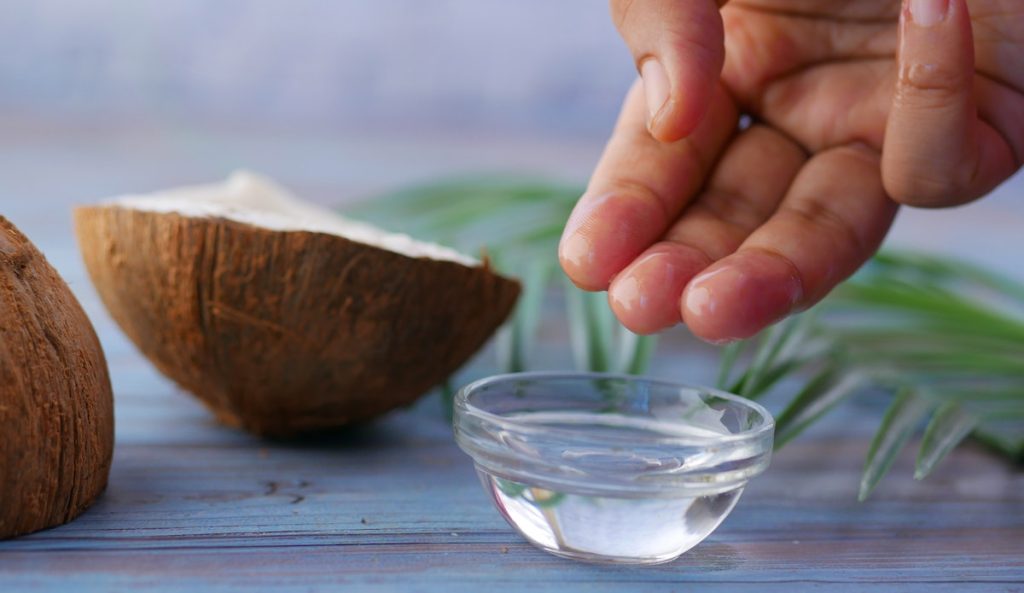
6. Coconut Oil Health Benefits for Hair
Using coconut oil on your hair is a great way to promote healthy hair growth. The fatty acids found in coconut oil can help repair damaged hair, reduce breakage, and add moisture. In addition, it can protect your hair from styling damage.
It can be used as a leave-in treatment, as a mask, or as a pre-wash conditioner. It is also beneficial for moisturizing the scalp, preventing dandruff, and increasing blood circulation.
The fatty acids in coconut oil can help strengthen the roots of your hair and provide a smooth, soft touch. They can also help to prevent protein loss, which can lead to thinning and unhealthy hair.
Coconut oil is also a good sunscreen, which can help to protect your hair from the harmful rays of the sun. It can also help to reduce microbial infections. The antifungal properties of coconut oil can help to relieve dandruff.
Coconut oil is beneficial for all hair types. It can be used on dry or wet hair, as a leave-in treatment, or as a hot oil treatment.
It is best to use unrefined coconut oil, or extra virgin oil. It is better for your hair because it is not processed. Refined coconut oil is often bleached.
It is important to use coconut oil on your hair in small quantities. It can take time for the oil to penetrate the hair shaft. If your hair is coarse, you may need to use more than one drop of coconut oil.
7. Coconut Oil is Effective in the Treatment of Epilepsy
Using coconut oil to treat epilepsy has a number of benefits. It helps increase good cholesterol levels, reduces inflammation of the brain and can also prevent gastrointestinal side effects of some medicines.
It contains medium chain fatty acids, or MCTs. MCTs are shorter chains of fatty acids that are more easily absorbed in the body than other fats. These fatty acids are more efficient at providing an energy source to the brain than longer chain fatty acids. MCTs are also more protective of the gastrointestinal tract.
Having more MCTs in the diet can increase a patient’s ketone levels. This enables the brain to use ketones as an energy source. This may benefit patients with memory loss and other brain disorders. Having more ketones in the body can also reduce the risk of Alzheimer’s disease.
MCTs are a component of coconut oil. They have been found to reduce the rate of seizures in children on ketogenic diets. They also help with other health conditions.
The ketogenic diet is a high-fat, low-carb diet that tricks the body into producing ketones, which can be used as a source of energy. It has been used to treat drug-resistant epilepsy in children. The ketogenic diet has also been shown to have neuroprotective effects on the hippocampus.
The ketogenic diet is a great way to lose weight, but it can also cause a variety of side effects. These include bloating, diarrhea and cramps. In addition, the ketogenic diet can cause nausea and vomiting.
8. Coconut Oil Health Benefits For Skin
Using coconut oil for skin care can be beneficial for a variety of reasons. It can help maintain the hydration of your skin, reduce inflammation and fight off aging.
One of the biggest benefits of coconut oil is its antioxidant properties. It neutralizes free radicals caused by pollution and UV rays. This is important since it has been shown that free radicals contribute to skin aging.
Another benefit of using coconut oil for skin is the fact that it can improve the lipid levels in your skin. This helps it retain moisture, which in turn makes it look young and healthy.
Another great benefit of using coconut oil is its antibacterial and antimicrobial properties. This makes it a good treatment for acne-prone skin. It can also help purify the pores and clear up any acne spots. It can even heal wounds and prevent thinning hair.
Lastly, coconut oil can boost the immune system. It contains medium-chain triglycerides, which are healthy saturated fats that promote immune function. It is also a natural humectant, which means it can trap moisture in your skin.
Depending on how you use it, coconut oil can also act as a natural exfoliator. It can be applied as a mask or mixed with a granular substance, such as sugar, to remove dead skin cells. This will not only smooth out the surface of your skin, it will also give it a softer feel.
If you want to use coconut oil for skin, you should be careful to use an unrefined product. Some of the refined varieties contain fewer beneficial properties.
9. Health Benefits of Coconut Oil For Liver Disorders
Among the many health benefits of coconut oil, it is also a very good treatment for liver disorders. It contains medium chain triglycerides (MCTs) and lauric acid, which are easily digested by the body. MCFAs help to keep the liver from getting damaged and have anti-microbial properties. They also contribute to a healthier skin.
The liver is one of the most important organs in the body. It is responsible for creating proteins and hormones for the rest of the body. It secretes bile, which aids in digestion. It also detoxifies the body. If the liver is damaged, it produces harmful free radicals.
Several studies have shown that coconut oil has a positive effect on cholesterol levels. It may also reduce inflammation and swelling caused by fatty liver disease. In addition, it has antibacterial, antifungal, and antioxidant properties.
The liver is also important for regulating blood pressure. It is important to have a balanced diet. Saturated fats are known to contribute to heart disease, while unsaturated fats are beneficial. A low-fat diet helps the body maintain a healthy level of cholesterol.
The University of Bonn scientists have found out how coconut oil is metabolized in the liver. They published their findings in a journal called Molecular Metabolism. They found that the medium-chain triglycerides in coconut oil help to prevent fat accumulation in the liver.
10. Health Benefits of Coconut Oil For Dogs
Adding coconut oil to your dog’s diet can be an effective way to improve his skin and coat. It is also a natural anti-fungal, antibacterial, and antiviral agent.
It is a good idea to consult your veterinarian before introducing coconut oil to your dog’s diet. They may have additional suggestions on how to use it.
The benefits of coconut oil for your dog include improved digestion, a healthy coat, and more energy. It also acts as a natural preservative. You can apply it directly to your dog’s coat or feed it as a meal topper.
Although the benefits of coconut oil are numerous, it should be used in moderation. It is full of saturated fats, and excessive amounts can be unhealthy. It is best to start with a small amount and gradually increase your dog’s intake.
The fatty acids in coconut oil are known to promote brain function and aid in weight management. They are also great for reducing hairballs.
Coconut oil is also a great massage oil. It is especially useful on dogs with arthritis or other joint problems. It also soothes irritated skin.
It is a good idea to give your dog a bath after rubbing coconut oil into his coat. This will make the coat smoother and less likely to shed. You can also rinse out the excess oil.
There are also several other health benefits of coconut oil. The antioxidants in the oil can help prevent infections and reduce allergic reactions. It can also improve cognitive function in older dogs.
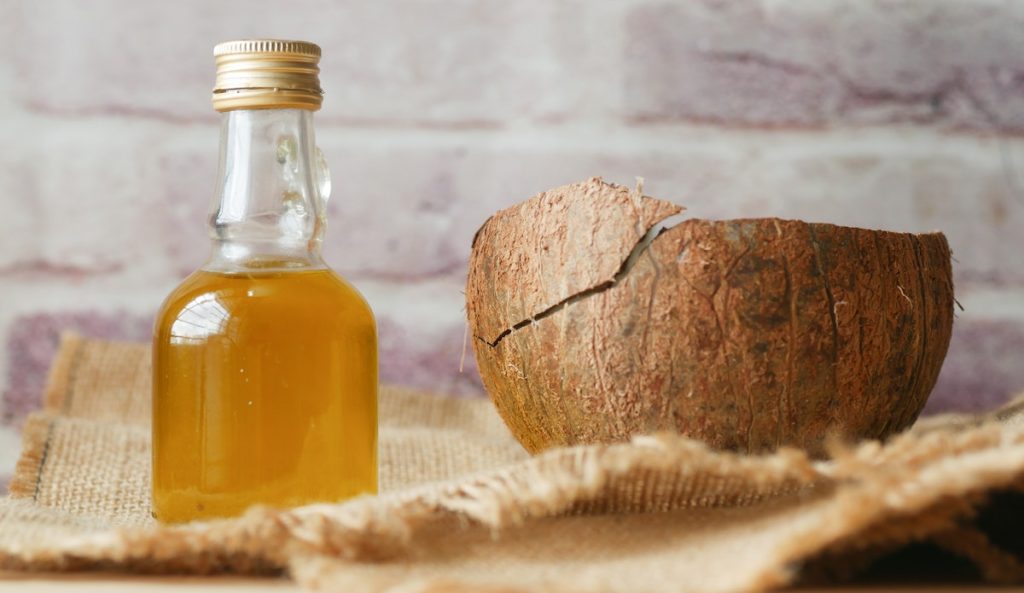
The Side Effects of Coconut Oil
Despite the many benefits of coconut oil, there are also some side effects of using it. Luckily, they can be avoided. Before you start taking coconut oil, you should consult a health professional for advice.
First of all, coconut oil is rich in saturated fats. This means that you should avoid eating it a lot. This will increase your cholesterol levels and may have other negative impacts on your health.
It has also been shown that some people can suffer from an allergic reaction to coconut oil. These reactions range from rashes and hives to nausea and vomiting. Fortunately, these reactions can be treated or mitigated with allergy testing. If you think you are allergic to coconut oil, you should avoid it until your doctor tells you otherwise.
Another side effect of using coconut oil is that it has anti-fungal properties. This may be helpful if you have an overgrowth of Candida. This common fungus can cause infections, and can be uncontrolled if not treated.
Turmeric and Coconut Oil – A Cure For Inflammation
Taking turmeric and coconut oil together can be an amazing cure for inflammation. The benefits are many. They’ll increase your energy, boost your immunity, and help your digestive system work more effectively.
The main active ingredient in turmeric is called curcumin. It’s a natural antioxidant and antimicrobial compound. It’s also got anti-inflammatory properties that can help fight arthritis and other diseases.
It’s also been shown to fight free radicals and improve skin hydration. It’s also thought to be an anti-cancer agent. It can also help prevent hyperpigmentation and protect against UV damage. It’s also been shown to increase dopamine and serotonin levels.
While turmeric and coconut oil have lots of health benefits, it’s worth noting that there are some risks associated with their use. For example, high doses of turmeric may cause anemia and gastrointestinal upset. You should also be careful to avoid using it around your eyes and ears.
One of the most impressive health facts about turmeric is that it has a super-powerful antioxidant. It’s also been known to boost brain functions, combat free radicals, and prevent Alzheimer’s disease.
It’s also been proven that turmeric can aid in weight loss. It’s also been said to boost immune function, protect against heart disease, and improve liver health. It can also lower cholesterol and help control bowel movements.
Besides its many health benefits, turmeric is a popular spice and has been used for centuries for medicinal purposes. It’s also been used as a skin treatment, and it can be added to a variety of foods and drinks.
Virgin Coconut Oil Health Benefits and Uses
Adding virgin coconut oil to your diet is a great way to help your body. This superfood is loaded with nutrients that help your body fight disease and maintain healthy cell growth.
Its saturated fats can help you burn abdominal fat and increase good cholesterol levels. It also helps promote metabolism and digestion.
One tablespoon of coconut oil has about 13 grams of saturated fat. Saturated fats have been linked to metabolic disorders, so you’ll want to avoid eating too much. The American Heart Association recommends that you stay below 120 calories from saturated fats if you’re eating 2,000 calories a day.
Unlike most oils, coconut oil has medium-chain triglycerides (MCTs). These healthy fats are not stored in your body’s fat tissue, but they are absorbed by your body quickly and turn into energy. They support your brain functions and cognitive development.
Its antioxidants are also powerful. Studies have shown that MCTs in coconut oil may help to prevent diseases like Alzheimer’s.
Its antimicrobial properties can help your immune system work better. It can even prevent Candida Albicans from growing in your gut.
It can also be used as a hair conditioner. It has high amounts of antioxidants and essential fatty acids, which can help repair damaged hair.
Its antimicrobial properties can also help to reduce inflammation. It has been proven to help eczema and other skin conditions. It can also be used to treat acne.
In addition to its health benefits, coconut oil has a nice taste. You can add it to your smoothie or salad dressing. It’s also an excellent cooking oil, especially for sautéing.
Is Cooking With Coconut Oil Healthy?
Using coconut oil in cooking has been a trend in recent years. However, there are many questions as to whether the oil really offers the health benefits it is marketed as.
Most people believe that coconut oil has positive health benefits. However, there is little evidence to back up these claims. In fact, some scientists argue that it could be unhealthy for you.
One of the main reasons why coconut oil is being touted as a health food is its unusual blend of fatty acids. This makes it different from most cooking oils. It contains a mix of medium chain triglycerides (MCTs), which are metabolized differently by the body than other dietary fats. These fats are also known to burn calories and are more effective at helping you lose weight.
Other health benefits of coconut oil include its antifungal, antibacterial, and anti-inflammatory properties. In addition, it is an excellent skin moisturizer. Besides, it has a long shelf life.
Despite the high amount of saturated fat in the oil, its unique composition is not linked to adverse cardiovascular outcomes. In fact, it is thought to improve brain function and decrease mental losses associated with Alzheimer’s disease.
Some research has even found that coconut oil may be able to dissolve kidney stones. This is due to its ability to keep the metabolic rate at a steady pace for a full 24 hours.
Another reason why coconut oil may be good for your heart is its MCT-saturated fat content. MCTs are known to increase blood ketone concentrations. These ketone concentrations are believed to reduce the frequency of seizures.
MCT Coconut Oil Health Benefits
Using MCT coconut oil health benefits can be a great way to increase energy levels. It is also used to fight infections and parasites. It can be consumed as a supplement to your diet or added to other foods. Some research suggests that it can help with weight loss, improving mood, and increasing muscle strength. It can even be used as a carrier oil for beauty products.
MCTs are a type of saturated fat that are more easily digested than longer chain fatty acids. They can help with digestion and may improve the gut environment. They may also be effective in treating autism and helping memory impairments in older adults. They have been found to reduce cravings.
MCTs can be found in other sources such as whole milk, butter, cheese, and palm oil. The best source for MCTs is coconut oil, which contains about fifty percent. They are broken down by the liver into triglycerides. The triglycerides are high in calories and can promote weight loss. They are also used as fuel for the mitochondria in the cells.
MCTs can increase HDL cholesterol, or “good cholesterol,” which helps protect the heart and lowers the risk of heart disease and stroke. They can also help maintain a healthy blood sugar level. They are also believed to reduce cravings and may be helpful for people with diabetes.
The benefits of MCTs have been studied in both humans and animals. Some studies show that they can help with cognitive performance and improve immune function. However, more high quality human studies are needed to draw stronger conclusions.
Refined Or Unrefined Organic Coconut Oil Health Benefits
Whether you prefer to use refined or unrefined organic coconut oil, there are many benefits to each. Both are healthy and can be used for cooking, as a beauty product, and as an ingredient in a wide variety of recipes.
The difference between unrefined and refined coconut oil has to do with the way it is processed. Refined coconut oil is deodorized and has a milder flavor. On the other hand, unrefined oil is not deodorized and has a more natural flavor.
Although the nutritional value of both types of coconut oil is similar, the benefits of unrefined are more apparent. This is because unrefined coconut oil has a lower smoke point. This means that it is easier to burn. This results in an increased metabolism and a quick source of energy.
Another key factor in the difference between refined and unrefined coconut oil is the amount of saturated fat. Saturated fat has been linked to an increase in LDL “bad” cholesterol.
The American Heart Association recommends that individuals consume no more than 13 grams of saturated fat per day. Adding a tablespoon of coconut oil to your diet can increase the levels of HDL (healthy) cholesterol, but the increase has not been linked directly to a decrease in the risk of heart disease.
However, some research has suggested that coconut oil may help with weight loss. One study has shown that people who consumed two tablespoons of virgin coconut oil every day for eight weeks saw a decrease in their LDL cholesterol. In addition, a 2004 study showed that MCFAs (medium chain fatty acids) from coconut oil improve memory problems in older subjects.
Health Benefits of Coffee With Coconut Oil
Adding coconut oil to coffee can give you a jolt of energy. It also helps you feel full longer. But there are some downsides to coconut oil in coffee, too. If you do too much, you can suffer from digestive problems and stomach cramps. So it is important to follow the recommended amount.
A good place to start is with one tablespoon. This amount contains about 120 calories. You can increase the amount gradually to a comfortable level.
You can also add ground cloves, cinnamon, or ginger for a warm, spicy flavor. You can also use milk to sweeten the drink.
The combination of caffeine and MCTs from coconut oil is known to improve energy levels. It is also thought to help with weight loss.
In addition to its metabolism-boosting properties, coffee also offers a lot of beneficial antioxidants. And the combination of MCTs and caffeine has been shown to improve cognition.
In fact, a study conducted in 2013 found that consuming coconut oil decreased the vasoconstriction of blood vessels. This means the oil may have a positive effect on heart disease and stroke risk.
There are many ways to incorporate coconut oil into your diet. It can be used for cooking, skin care, and hair care. It is also known as a natural laxative. Some people have allergic reactions to the substance.
A healthy dose of coconut oil can also have a positive impact on your immune system. It has been shown to combat viral infections.
Various Comparisions of Coconut oil with other oil Health Benefits
1. Health Benefits of Olive Oil Vs Coconut Oil

Among the health benefits of olive oil and coconut oil are antioxidant effects, antimicrobial properties, and the ability to prevent free radical damage. Olive oil also has a high concentration of bioactive phenolic compounds, which can reduce cholesterol levels. Compared to coconut oil, olive oil has a higher percentage of monounsaturated fats and polyunsaturated fats, which are both known to have positive effects on heart health.
Those who have high LDL cholesterol and/or triglyceride levels are at a higher risk for developing cardiovascular diseases. This is one reason the American Heart Association recommends replacing saturated fats with monounsaturated fats.
Olive oil and coconut oil are both versatile cooking oils, and both provide the same amount of calories per tablespoon. However, olive oil has a significantly higher fatty acid profile, as well as more nutrients, such as omega-3 fatty acids.
The antioxidants in both oils are important for preventing oxidative stress, which can lead to cellular damage. In particular, olive oil is an excellent source of oleocanthal, a bioavailable phenolic compound that has potent anti-inflammatory and cholesterol-reducing effects.
2. Health Benefits of Coconut Oil Vs Palm Oil
Several studies have questioned the health benefits of coconut oil. Its health profile is a bit different than other oils, though. Palm oil has been linked to negative health effects. Its production requires clearing tropical rainforests, which is not good for the environment or wildlife.
One study found that palm oil increased cholesterol in healthy people. Others have suggested that it can raise bad cholesterol. Regardless, it is clear that saturated fats are not good for our hearts. A diet rich in anti-inflammatory foods can help lower heart disease risk.
Palm oil is also a rich source of vitamin E. This antioxidant helps protect the arteries from oxidative damage. It is necessary for cell communication and immune system function. It also reduces the risk of age-related macular degeneration.
Unlike other oils, the saturated fatty acids in palm oil are more balanced. It has a lower ratio of stearic acid to capric acid. It also contains choline and myristic acid, which may help improve the body’s absorption of other fat-soluble vitamins.
The high level of saturated fat in palm oil raises the total and low-density lipoproteins in the bloodstream. The resulting increase in LDL cholesterol has been linked to a greater risk of heart disease. In the same way, a high-saturated fat diet increases triglycerides. However, a moderate consumption of coconut oil has shown no adverse side effects.
Red palm oil has a higher level of saturated fat. It is also rich in carotenoids, such as beta-carotene. This is what gives red palm oil its reddish-orange color. In addition, red palm oil has a high smoke point. Its unique flavor makes it suitable for many dishes.
3. Coconut Milk Vs Coconut Oil Health Benefits
Whether you prefer coconut oil or coconut milk, there are a number of health benefits to be gained from both. You may find that they both help you lose weight. They are both beneficial for reducing inflammation, and boosting your immune system. They are also good for your hair and skin.
Coconuts contain a lipid called lauric acid, which has antifungal and antimicrobial properties. It is also known to boost your HDL cholesterol, which is important for your heart. However, it can raise LDL, or bad cholesterol.
Some studies suggest that coconut milk can help reduce your risk of cardiovascular disease, and may even promote weight loss. Adding a small amount of coconut milk to your diet can help your body get the benefits of the saturated fat.
The fat in coconut milk and oil has been shown to have antioxidant effects, which can help prevent damage to the body from free radicals. Oxidative stress is associated with many health issues.
4. Coconut Oil Vs Mustard Oil Health Benefits
Compared to coconut oil, mustard oil has a pungent taste and flavour. Its benefits are derived from its unique blend of monounsaturated and polyunsaturated fats. These fatty acids are essential for skin health and can be beneficial for hair.
Mustard oil is rich in vitamins and antioxidants. It also contains a compound known as allyl isothiocyanate, which is believed to have anti-inflammatory properties.
Mustard oil is also rich in B-complex vitamins, which are believed to help promote skin health. It can also help increase your body’s metabolism. It is a good source of dietary fiber and calcium.
The antibacterial and anti-inflammatory properties of mustard oil are believed to aid in healing several strains of fungi and bacteria. It can also relieve dermatitis and soothe inflammatory conditions such as eczema and acne.
Mustard oil can also be applied to the scalp to help grow healthy, thick hair. It may also be used to fight fungal-induced dandruff. It can also be used to promote healthy teeth.
Mustard oil is rich in vitamin E, which is thought to protect your skin from the damaging effects of ultraviolet rays. It is also believed to reduce inflammation on the scalp.
The antibacterial and anti-inflammatory powers of mustard oil are also believed to help lower LDL cholesterol. It can also boost HDL cholesterol. It is considered a good natural cleanser and can help you achieve a glowing complexion.
Mustard oil can be mixed with coconut oil to create a facial mask. Then apply it to your face for 10 to 15 minutes. This can be followed up with a rinse of cold water.













